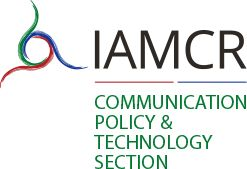
The Communication Policy and Technology Section is pleased to announce the recipients of its best paper awards for 2018.
This year we presented two awards. The CPT Best Paper Award for a paper submitted in advance of the conference which best represents the balance of theory, research, writing and policy engagement that we welcome in the tradition of the section and the CPT/Internet Policy Review Award which meets the above criteria but also makes a significant contribution to internet policy research.
The CP&T best paper award 2018
“Airing Imperium: A Historiography of Radio Governance in South Asia”, by Preeti Raghunath, University of Hyderabad, India.
The year 1927 emerged as a landmark in the world history of radio, more particularly in South Asia. Over ninety years hence, this paper seeks to stitch together a critical historiography of radio governance in colonial South Asia. In doing so, the paper seeks to unravel colonial constructions, norms and rationalities associated with the modern medium of radio in the South Asian context. This paper draws on the works of Alasdair Pinkerton (2008), Joselyn Zivin (1994, 1998, 1999), Brayne (1929), Simon Potter (2012) and gleanings in their work of the autobiographical writings of Lionel Fielden (1960) and John Reith (1949), the First Broadcasting Controller of All India Radio and the General Manager of the British Broadcasting Corporation, respectively, besides some official documents cited in these works, pertaining to the goings-on in British South Asia and its broadcasting. Ultimately, this paper seeks to not only historicise eventual decolonization and democratization that occurred, but also sets the stage to locate, understand and move towards sustainable media governance in a post-2015 world.
Bio: Preeti Raghunath has recently submitted her PhD, titled 'Deliberating Community Radio in South Asia: A Critical Policy Ethnography', to the Department of Communication, University of Hyderabad, India. Her research interests include media policy in South Asia, critical media policy studies, transitional societies and human security, and policy ethnography as a methodology.
The inaugural CP&T and Internet Policy Review Award
“Beyond ‘zero sum’: Balancing Network Neutrality and Mobile Broadband Access in the Regulation of Zero Rating”, by Guy T. Hoskins, York University Canada.
The epicentre of Internet policy debates has shifted to the global South where ‘zero rating’ mobile apps – exempting content and services from data charges – has proved contentious. Critics contend that zero rating (ZR) imperils network neutrality, while proponents defend ZR as an Internet on-ramp for billions. Prevailing voices have thus reduced zero rating to a zero sum game. As a corrective, this paper argues that instead of siloing the issues of network neutrality and the digital divide, and their relationship to zero rating, these sets of concerns must be drawn into a nuanced debate with one another. To advance this approach, I analyse the multiple forms of ZR offered in four wireless markets – Brazil, Colombia, Mexico and South Africa - across two dimensions: political-economic and developmental. In so doing, I systematically connect the dominant arguments around ZR’s impacts on net neutrality and digital inclusion to on-the-ground realities. I make the resulting case that we must move beyond absolutist judgements on zero rating. Instead, through granular contextualization, we should recognise the complexity of factors related to network neutrality and digital inclusion in order to arrive at an informed appraisal of this pervasive, and divisive, form of mobile Internet access.
Bio: Guy T. Hoskins is a doctoral candidate (ABD) at York University and a course instructor at Ryerson University. His research focus is the global political economy of digital media, and particularly its intersection with questions of digital rights and communication policy. His doctoral thesis examines the constitution of digital rights at the periphery of informational capitalism through analysis of Brazil’s 2014 law, the Marco Civil da Internet.
Congratulations to both winners.